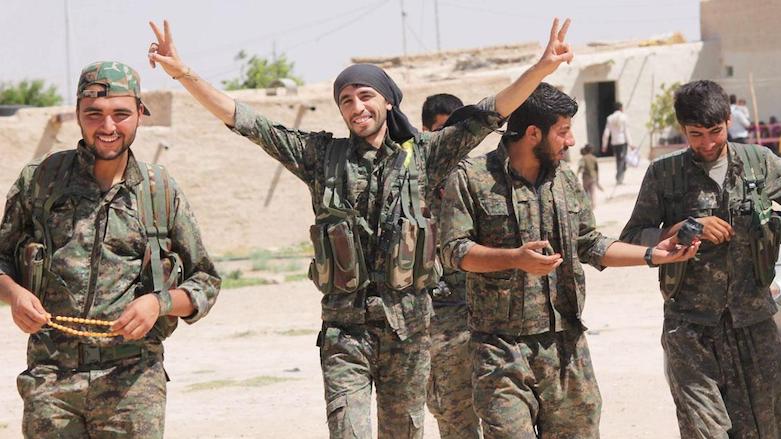Coalition: Kurdish-led forces creating most stable areas of Syria

WASHINGTON DC (Kurdistan 24) – Col. Thomas Veale, Director of Public Affairs for the US-led Coalition, formally known as Combined Joint Task Force-Operation Inherent Resolve (CJTF-OIR), told reporters on Tuesday that the “successes” of the Kurdish-led Syrian Democratic Forces (SDF), the Coalition’s main partner in fighting the Islamic State (IS) in Syria, were “creating the most stable areas” in that country.
Backed by coalition airpower, on May 1, the SDF began Operation Roundup, which aims to defeat IS “remnants” in the Middle Euphrates River Valley and along the Syrian-Iraqi border, Veale explained.
The second phase of the operation, focused on clearing IS from Dashisha, some 50 kilometers from Syria’s border with Iraq, began on Sunday.
The morale of IS fighters “is low,” Veale said, and its “leaders are scurrying for their lives.”
“Quite a bit of [IS] traffic” is “flowing west toward Syrian regime-held territory,” he revealed.
Veale also described the “positive” meeting that Maj. Gen. Walter Piatt, CJTF-OIR Deputy Commanding General for Transition, had with the Chancellor of the Kurdistan Region Security Council, Masrour Barzani.
The two men discussed cooperation between the Peshmerga and the Iraqi Security Forces (ISF) in order “to continue the defeat of [IS] within Iraq,” Veale explained in an email to Kurdistan 24, including “potential future joint operations between the ISF and Peshmerga.”
Such operations ended, following Baghdad’s Oct. 16 assault on Kirkuk and other disputed territories. Their resumption would mark a significant development.
“Continued Coalition training support to the Peshmerga,” as well as “identifying how the training process” might be “refined to meet the future needs of the Peshmerga, as their capacity continues to build” was a second major topic of discussion.
Monday’s engagement marked the third time that Barzani and Piatt have met since late March.
Veale also described a problem that has arisen, as the battle against IS nears its end: the SDF has more prisoners than it can handle.
There are “hundreds of foreign terrorist fighters under SDF detention in Syria,” he said. But the SDF does not have the capacity to handle them.
Moreover, “detention centers are a breeding ground for radicalism,” Veale affirmed, as he called on governments to “claim their citizens and bring them to justice in their home countries.”
He also described the vicious, unprecedented brutality of IS’ bombs—their Improvised Explosive Devices (IEDs).
“Before evacuating Raqqa, [IS] seeded civilian homes with thousands of them,” he said, “leaving them in children’s toys, bedding and blankets, and even baby food formula.”
There is, however, a rational objective behind such horrors: to disrupt stabilization efforts and cause people to become angry at the political authority that replaces IS.
Veale also addressed several specific issues.
He explained that the Coalition convoy seen recently around Sinjar (Shingal), was moving in tactical support of Operation Roundup, rather than preparing a bigger mission.
Also, NATO has “recently concluded a site survey in Iraq,” Veale disclosed. It “is discussing” a future “presence” with the Iraqi government, “at the invitation of the Iraqi government.”
Given Baghdad’s notorious sensitivity about a US military presence in the country, possibly, it is considering replacing the US-led Coalition with a NATO force to carry out what will, in the end, be the primary mission of Western forces: namely, training the ISF.
Asked if he was concerned about the recent demands of Syrian President Bashar al-Assad and his Foreign Minister, Walid al-Muallem, that the US leave the country, and the threat of terrorism that implicitly accompanies such demands from Damascus, Veale answered no.
“Our operations area is east of the Euphrates, in northeastern Syria,” he stated.
“As I said in my opening statement, it is the most secure and stable part of the country,” he continued. “So that is not a concern for me.”
